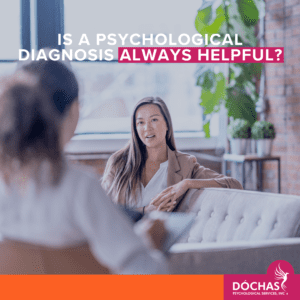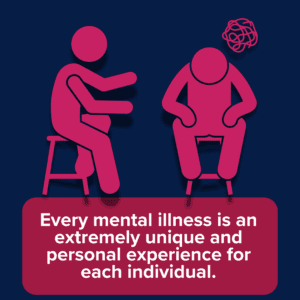Diagnosis can be a controversial topic. It’s Skye on the blog today and I want to discuss this pressing subject, as many clients wonder: “Do I need a diagnosis?”.
Simply put, a diagnosis may not be suitable or beneficial for everyone.
Can a diagnosis be harmful?
For many clients, psychological care is tailored to the client’s presentation rather than a confirmed diagnosis. Some would argue that diagnosing all clients is leading to the overmedicalization of psychological care. In some cases, it may solidify the idea that the client is worse off than they thought, when they may just need a couple of extra tools to add to their toolbox. So, for some, diagnoses can make their challenges seem more intimidating than they need to be, with no real value!
Another consideration is that diagnosis can also take clinical time that would be better used in giving therapy to the client.
When can a diagnosis help?
For some clients presenting treatment-resistance (where traditional therapeutic approaches have been ineffective in alleviating their symptoms) or complex symptom constellations (where multiple interrelated symptoms manifest simultaneously, often making diagnosis and treatment challenging) or those requiring pharmacology, an accurate diagnosis can help ensure appropriate care, following empirical evidence.
Similarly, when a clinician consults research or peers, or if they conduct their own research, a diagnosis can help the clinician communicate ‘in the same language’ as their peers. This facilitates collaboration and the exchange of knowledge within the professional community. By having a clear diagnostic framework, clinicians can effectively discuss cases, share insights, and refine treatment strategies based on the latest empirical evidence.
For some clients, diagnosis is important to gain access to support through insurance. Insurance companies often require a formal diagnosis to authorize coverage for mental health services or specialized treatments, so a diagnosis can ensure that clients can access the necessary resources to address their mental health needs effectively.
The DSM-5-TR: Its Role in Diagnoses
Interestingly, groups of top specialists in the field get together every few years to debate and negotiate what is included in the Diagnostic and Statistical Manual. The DSM-5-TR is essentially a big book that outlines all the psychological diagnoses and their criteria for clinical diagnosis. This means that diagnoses and the criteria required to diagnose them can be removed, added, or revised.
For example, grief can be an extremely unique and personal experience for individuals. The DSM-5-TR recognizes a diagnosis for grief (with specific criteria). This is great news for some clients who are grieving and need a diagnosis to access support, but on the other hand, this seems to suggest that there is something ‘wrong’ with a grieving process that presents itself in a different way.
Final Thoughts
While diagnosis can offer validation, clarity, and access to treatment and support services, it also carries potential risks and consequences. It is important for clinicians to consider the benefits, risks, and costs associated with the ethics of diagnosis.
If you have any more questions, we invite you to reach us at 780-446-0300 or at info@dochaspsych.com.
About Dóchas Psychological
Dóchas Psychological Services is a well-established and trusted therapy clinic located in Spruce Grove, Alberta. At Dóchas we value the idea that everyone deserves a safe space. Through connection and education, our team works hard to build a trustworthy relationship with each of our clients. It is our goal to create a community for our clients to feel like they belong.
Disclaimer
Information provided through Dóchas Psychological Services blogs or vlogs is meant for educational purposes only. They are NOT medical or mental health advice. You can read more about our disclaimer here.











